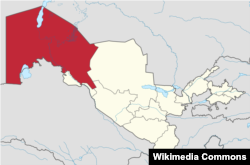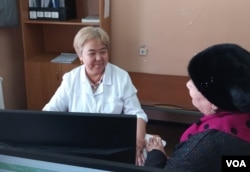Uzbek law enforcement officials this month confirmed to VOA that an Uzbek extradition request was behind the February 15 arrest in Kazakhstan of Karakalpak activist Akylbek Muratov, known as Aqylbek Muratbai on X and other social media.
Karakalpaks are indigenous Turkic people of Karakalpakstan, since 1993 a sovereign republic within Uzbekistan with its own parliament, national symbols and language. This status has been a source of friction with the Uzbek government because it often stirs discussions of secession.
Muratov, arrested in Almaty, Kazakhstan's largest city, had been under Uzbek scrutiny since 2015. He is suspected of engaging in separatism and “destructive activism,” according to officials in Tashkent.
Karakalpakstan's Internal Affairs Ministry indicted him late last year, accusing him of preparing and distributing materials that "threaten public safety and order." Uzbek authorities say he has used social media to foment mass unrest in Karakalpakstan, but he denies the charges.
Uzbek officials told VOA that Muratov had been warned through the Uzbek Consulate in Almaty and by his father, but that he persisted in what Tashkent views as anti-government propaganda. Writing on the X social media platform, formerly Twitter, in October, Muratov described these messages as threats and vowed to "not stop my activities to disseminate information about repressions against ethnic Karakalpaks in Uzbekistan.”
Muratov is the sixth Karakalpak to be taken into custody in neighboring Kazakhstan at Uzbekistan’s request since protests in July 2022 against proposed constitutional amendments intended to strip the republic of its autonomous status and right to secede. At least 21 people were killed during the unrest in Nukus, Karakalpakstan’s capital.
None of the five previously arrested in Kazakhstan has been extradited, but they have not received refugee status, which would offer more international protection, including the opportunity to resettle in another country. Muratov, who lived in Kazakhstan for 13 years, is seeking that status.
As a result of the unrest, Uzbek President Shavkat Mirziyoyev withdrew the proposed amendments that triggered mass discontent and pledged not to change Karakalpakstan's status.
Sixty-four people were convicted for their roles in the violence. One defendant, former police officer Polat Shamshetov, died in prison in February 2023, shortly after receiving a six-year prison term. The longest sentence, 16 years, was given to the lawyer and blogger Dauletmurat Tajimuratov, whose case Muratov often highlighted.
Karakalpaks in Kazakhstan on edge
Muratov’s detention, days after a new Kazakh government was sworn in, has drawn attention to Kazakhstan and put Karakalpaks in Kazakhstan on edge.
Muratov’s sister, Fariza Narbekova, told VOA that he has been charged by Uzbek authorities for publishing video of Karakalpak activists’ speeches at an Organization for Security and Cooperation in Europe conference in October and for urging Karakalpaks on his Telegram channel to switch off lights at home on November 13 for 16 minutes to mark the first anniversary of Tajimuratov’s 16-year imprisonment.
Mihra Rittmann, senior Central Asia researcher at Human Rights Watch, said in a February 26 statement that the charges “have no merit and should be dropped, and Kazakhstan should release him from custody immediately.”
“Kazakhstan is bound by international human rights law not to return Muratbai to Uzbekistan, where he faces serious risk of politically motivated persecution,” she said.
Human Rights Watch said human rights organizations had “documented numerous cases of torture and other ill-treatment, and arbitrary detention, of individuals accused of anti-state crimes in Uzbekistan in recent years.”
This is “a clear-cut case of retaliation” by Uzbek authorities against Muratov for exposing human rights violations in Karakalpakstan following the July 2022 protests, Rittmann said.
Karakalpaks feel discriminated against in their own homeland because migrants from other parts of Uzbekistan are given jobs and farmland there, Galym Ageleuov, an Almaty-based Kazakh rights activist, told VOA.
The proposed constitutional amendments triggered an outpouring of discontent that had built up in Karakalpakstan for years, he said, citing local frustration that Tashkent brings workers from elsewhere to develop gas fields in the Aral Sea region instead of employing locals.
“What Kazakh authorities are doing to Karakalpak activists living in Kazakhstan by detaining them is an incompetent policy to suppress the diaspora and its activists who are standing up for rights, and it’s the continuation of Uzbek authorities’ suppression of human rights in Karakalpakstan,” said Ageleuov, who has researched the July 2022 events and monitored subsequent developments in Karakalpakstan.
“Person seeking asylum” status
In what is seen as a face-saving exercise, on February 23, Kazakh authorities granted Muratov “person seeking asylum” status for three months, preventing him from being handed over to Uzbekistan during that period, treatment similar to that of the five other Karakalpaks, who were released after a year in detention.
Muratov was instrumental in publicizing the detentions and court proceedings involving Karakalpaks in Uzbekistan and Kazakhstan on social media.
“We fought for the rights of Karakalpakstan and Karakalpaks and activists, and ordinary Karakalpaks who were imprisoned after the July events rely on our help for their release,” cardiologist Raysa Khudaybergenova, one of the five Karakalpaks detained in Kazakhstan, told VOA in an Almaty clinic where she works.
“They all want to get out of prison,” she said of the activists who remain in Uzbek prisons.
Like Muratov, Khudaybergenova is an Uzbek citizen and was not involved in political activism before the 2022 turmoil, focusing mostly on cultural, linguistic and health issues in Karakalpakstan.
Denis Zhivago, an Almaty-based human rights lawyer, told VOA that according to Kazakh law, “detention on extradition requests could last for a year, that’s why other Karakalpak activists spent a year in detention.” Muratov’s lawyer, Inara Masanova, would not comment on the case because of its sensitivity.
“Akylbek is now likely to spend a year in detention, unfortunately,” Zhivago said.
“As in the previous five cases, I hope wisdom would triumph with Kazakh authorities and they will give the man a chance to avoid extradition and leave for a third country. There is a big chance that will happen, but we shouldn’t rule out any possibilities.”
In the past, Kazakhstan was notorious for handing over those without refugee status. It extradited about 30 Uzbek asylum seekers to Tashkent and at least one Uyghur to Beijing in the early 2010s. Last December, it extradited Russian security officer Mikhail Zhilin at Moscow’s request.
Zhivago said Uzbekistan keeps submitting extradition requests because it is “irritated” and wants to silence activists publicizing violations of rights in Karakalpakstan.
This has left Kazakhstan in a “complicated” situation because it is bound by agreements and friendly relations with Uzbekistan, he said.
“Our government, on the one hand, doesn’t want to spoil relations with Uzbekistan and, on the other hand, wants to provide Karakalpak activists with a chance of obtaining asylum,” Zhivago said. He noted Kazakhstan’s status as a signatory to the Geneva conventions against torture and on the status of refugees.
Navbahor Imamova reported for this article from Washington.














